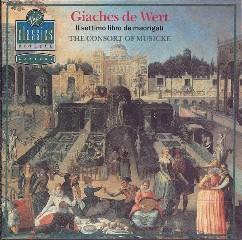Giaches De Wert – Il Settimo Libro De Madrigali (1989)
Giaches De Wert – Il Settimo Libro De Madrigali (1989)

1 Sorgi E Risehiara 6:05 2 Misera, Che Farò 3:28 3 Donna, Se Ben Le Chiome 5:19 4 Vive Doglioso Il Core 2:29 5 Vani E Schiocchi 2:06 6 Vaghi Boschetti 2:12 7 Io Mi Vivea Del Mio Languir 5:42 8 Solo E Pensoso 5:16 9 Giunto Alla Tomba 5:55 10 Voi Volete Ch'io Mnoia 4:11 11 Grazi Ch'a Pochi Il Ciel 5:52 12 Tirsi Morir Volea 4:00 13 Il Qual Parte Si Ratto 4:05 The Consort Of Musicke Anthony Rooley - conductor
"Settimo Libro de Madrigali" (Seventh Book of Madrigals) performed by the Consort of Musicke is a group of thirteen madrigals mostly concerned with 'aspects of love' (with apologies to Andrew Lloyd Webber).
Gaiches de Wert (1535-1596) was one of the last two important madrigalists from Northern Europe who worked wholly or mainly in Italy. He was one of the most progressive composers of his day whose works are known for their vivid word painting, telling use of chromaticism, wide voice range, declamatory passages and a tendency to make the lower voices accompany the upper.
He was Director of Music at Mantua, where he composed his seventh and eighth books of five-part madrigals (1581-1586); they were polyphonic and included prominent soprano parts, rapidly running lines and WRITTEN-OUT ornamentation(clever man; interpreting ornaments is the bane of the performers existence). His music did indeed anticipate the new music of Monteverdi, and he was his [predecessor).
This seventh book of Madrigals represent some of DeWert's finest music and covers a wide variety of subjects and moods. The music is rich and densely textured and many dwell on the more painful aspects of love. The poetic text is of exceptionally high quality and is enhanced greatly by Wert's treatment of it: varied vocal scoring, sudden shifts in texture, vivid madrigalisms in response to individual keywords such as 'streams' or 'abyss' 'weeping' 'trembling', and harmonic nuances; he rarely fails to capture the hidden emotional agenda of each text.
The Consort of Musicke was founded by its director ,Anthony Rooley, (Emma's husband) in 1969, at which time there were 6 singers; on this disc there are seven. In addition, Michael Chance-countertenor-makes an occasional appearance when they need his voice.. Unfortunately, he is only on one selection in this group. Other singers involved are:E.Kirkby,E.Tubb, S.LeBlanc (sopranos)-M.Nichols(alto)-A.King,R.Miller(tenors) and A.Ewing(bass). Skilled singers all!!
The singing of the Consort of Musicke responds well to all the demands of this music: unfailingly sensitive to word implications, well shaped melodic lines, balance that allow the textures to breathe and the harmonies to glow. This is indeed an exciting and very entertaining recording, and through the years I have played it again and again! ---George Peabody, amazon.com
download (mp3 @320 kbs):
yandex mediafire ulozto gett bayfiles
